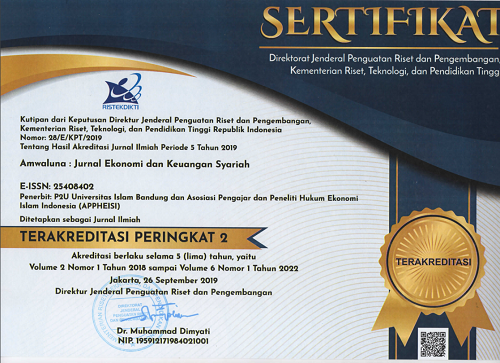DEVELOPMENT OF CASH WAQF BENEFITS SYNERGY FOUNDATION IN THE ECONOMIC EMPOWERMENT OF THE UMMAT
Abstract
This paper discusses the development of cash waqf benefits which is directed at empowering the community's economy carried out by the synergy foundation in West Java. Cash waqf as one of the shari'ah financial instruments should be able to provide added value usefulness and a multifier effect in reviving the community's economy. The aim is to map the quality of institutions in managing the benefits of cash waqf for the economic empowerment of the people. The approach used is case studies with qualitative methods, the data were analyzed descriptively with a phenomenological naturalistic paradigm which emphasizes the nature of social reality and studies what appears in society. The results obtained in the field Sinergi Foundation have carried out professional, transparent and accountable, financial management using the accounting standard for zakat PSAK 109. The financial reports are audited by an independent public accountant and the results are Unqualified (WTP).
Keywords
Full Text:
PDFReferences
Abdul Mubaraq, (2018). The Waqf Management: Perspective in Comparison, Journal of Finance and Islamic Banking. 1 (2), http://ejournal.iainsurakarta.ac.id/index.php/jfib
Atan, N. A. B., & Johari, F. B. (2017). A review on literature of Waqf for poverty alleviation between 2006-2016. Library Philosophy and Practice, 2017(1).
Azrai Azaimi Ambrose, A. H., Gulam Hassan, M. A., & Hanafi, H. (2018). A proposed model for Waqf financing public goods and mixed public goods in Malaysia. International Journal of Islamic and Middle Eastern Finance and Management, 11(3), 395–415. https://doi.org/10.1108/IMEFM-01-2017-0001
Chamidah, U. (2008). Pengelolaan Asset Wakaf Tunai Pada Lembaga Keuangan Syariah (Studi Pengelolaan Wakaf Tunai Di Baitul Mal Hidayatullah Malang). Retrieved from http://etheses.uin-malang.ac.id/4261/1/04210042.pdf
Departemen Agama, 2007, Fikih Wakaf, Jakarta, Dirjen Wakaf.
Holsti, C. R. (1969). Content Analysis for The Social Science and Humanities, Canada: Departement of Political Science University of British Colombia.
Huda, N. (2012). Keuangan Publik Islam “Pendekatan Teoritis dan Sejarah.” Jakarta: Kencana.
Huda, N., & Heykal, M. (2010). Lembaga Keuangan Islam Tinjauan Teoritis dan Praktis. Jakarta: Kencana.
Kasdi, A., 2014. Peran Nadzir Dalam Pengembangan Wakaf. Jurnal Zakat dan Wakaf. Vol 1 (2). https://journal.iainkudus.ac.id/index.php/Ziswaf/article/view/1483
Kasdi, Abdurrahman. (2015). Peran Waqf Produktif Dalam Pengembangan Pendidikan. Jurnal Pendidikan Islam, 3(2), 433–452. https://doi.org/10.21043/QUALITY.V3I2.1917
Khoirul Anwar, Moch at al. (2020), THE ROLE OF Al-HISBAH IN IMPLEMENTATION OF BUSINESS ETHICS IN TRADITIONAL MARKETS, Amwaluna: Jurnal Ekonomi dan Keuangan Syariah, Vol. 4 No. 2 Juli 2020 Page158-175 Online ISSN : 2540-8402 | Print ISSN : 2540-8399
Mikail, S. A., Ahmad, M. A. J., & Adekunle, S. S. (2017). Utilisation of zakāh and Waqf fund in micro-takāful models in Malaysia: an exploratory study. ISRA International Journal of Islamic Finance, 9(1), 100–105. https://doi.org/10.1108/IJIF-07-2017-010
Mohamad, F., Asmak, S., Rahman, A., Marican, S., Raimi, L., Patel, A., & Adelopo, I. (2014). The role of share Waqf in the socio-economic development of the Muslim community: The Malaysian experience"Corporate social responsibility, Waqf system and Zakat system as faith-based model for poverty reduction". Humanomics International Journal of Social Economics World Journal of Entrepreneurship Management and Sustainable Development,30(3),227–254. Retrieved from http://dx.doi.org/10.1108/H-12- 2012-0025%5Cn http://dx.doi.org/10.1108/03068290210413038%5Cn http://dx.doi.org/10.1108/WJEMSD-09-2013-0052
Moh’d, I. S., Omar Mohammed, M., & Saiti, B. (2017). The problems facing agricultural sector in Zanzibar and the prospects of Waqf-Muzar’ah-supply chain model: The case of clove industry. Humanomics, 33(2), 189–210. https://doi.org/10.1108/H-02-2017-0033
Mokhtar Ismail, Hairullfazli Muhammad Som, Mohd Isa Mohd Deni, & Muna Sulaiman. (2015). Model Operasi Wakaf Pendidikan di Malaysia. International Conference on Cash Waqf (ICCW), 2015(May), 215–228.
Muhajir, N. (1990).Metodologi Penelitian Kualitatif, Yogyakarta : Rakesaraseh.
Muhammad Iqmal Hisham et al. (2018) Waqf Management Practices: Case Study in a Malaysian Waqf Institution, World Journal of Social Sciences, 8 (3), 1-12.
Nurul Azma et al. (2017) Exploring The Factors Of Organization Structure To Improve Waqf Management In Malaysia. International Journal of Islamic Business, 2 (2), 79-88.
Ridwan, M. (2018). Waqf Dan Pembangunan Ekonomi. ZISWAF : Jurnal Zakat Dan Waqf, 4(1), 105. https://doi.org/10.21043/ziswaf.v4i1.3034
Sadeq, A. M. (2002). Waqf, perpetual charity and poverty alleviation. International Journal of Social Economics, 29(1–2), 135–151. https://doi.org/10.1108/03068290210413038
Shaikh, S. A., Ismail, A. G., & Mohd Shafiai, M. H. (2017). Application of Waqf for social and development finance. ISRA International Journal of Islamic Finance, 9(1), 5–14. https://doi.org/10.1108/IJIF-07-2017-002
Siregar, D. D. (2004). Manajemen Aset : Strategi Penataan Konsep Pembanguan
Siswanto, I. E., & Suprapto, E. (2014). Management Productive Waqf Optimalization (Case Study Tabung Waqf Indonesia). Seminar Waqf Iqlimi, Universitas Sains Malaysia, 374–395.
Surahman Maman, Nurrohman, (2020), ANALYSIS OF MAQÂSHID AL-SYARȊ’AH ON THE APPLICATION OF THE COLLATERAL IN THE MUDHȂRABAH CONTRACT IN SHARIA FINANCIAL INSTITUTIONS, Amwaluna: Jurnal Ekonomi dan Keuangan Syariah, Vol. 4 No.2 Juli 2020 Page 276-287 Online ISSN : 2540-8402 | Print ISSN : 2540-8399
Usman, N. (2014). Pengelolaan wakaf produktif untuk kesehatan. Muaddib, 04(02), 1–20.
Van Laer, P. H. (1956). Philosophy of Science, Pittburgh :Dugnesne University.
DOI: https://doi.org/10.29313/amwaluna.v5i1.6916
Refbacks
- There are currently no refbacks.
Editorial Office:
Syariah Faculty, Universitas Islam Bandung
Jalan Tamansari No. 24-26 Kota Bandung

Amwaluna : Jurnal Ekonomi dan Keuangan Syariah is licensed under a Creative Commons Attribution-NonCommercial-ShareAlike 4.0 International License.







